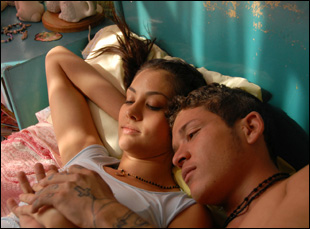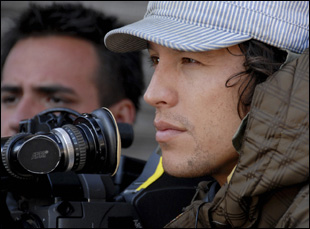In light of his phenomenal work on HBO’s “True Detective,” we dug up this interview with Cary Joji Fukunaga on the occasion of his first film, the remarkable “Sin Nombre.” Originally published on IFC.com on March 24th, 2009.
Following an explosion at Sundance where Cary Joji Fukunaga picked up prizes for best direction and cinematography, “Sin Nombre” came to theaters this weekend almost as if it were propelled there by the sheer force of its buzz. The film tells of Casper (Edgar Flores), a disgraced gang member who hops a train headed to the States in an attempt to get away from his former crew. When he saves Sayra (Paulina Gaitan) from an attack among the hundreds of would-be immigrants lining the roof of the train, the two go on the run together. But love isn’t in the air for Casper and Paulina, only flying bullets, and the gritty thriller becomes a refreshing blast of no holds barred filmmaking that seems to stem directly from Fukunaga’s fortitude, a personality trait that likely came in handy for the NYU grad as he researched the film by traveling on the same trains in Mexico and witnessing horrors that eventually made it into the script. Fukunaga recently brought the film to SXSW, where he took the time to talk about the perils of expanding a short film into a full-length feature and shooting on a moving train.
 How did you become interested in this subject?
How did you become interested in this subject?
It’s really accidental. I did a short film while I was at NYU called “Victoria Para Chino” and while doing research, learned about the Central American part of the journey. It’s just something I never heard before, and so when I had the opportunity to make a feature film, that’s immediately what I chose to focus on. They’re kind of one and the same in that sense, the short film and the feature film. They’re not going to be my only direction in filmmaking, but they kind of exist as a pair.
One of the most striking aspects to me was how you handled the treatment of immigrants as they were passing through different parts of the country — first being greeted by apples to eat in one area and being attacked by rocks from the hands of children in another section. Was that something that came from your own research?
Part of it was my own experience and part of it was…I met a kid in Reynoso, [near] the Texas border, and he was telling me about one part of his trip in northern Mexico where the local kids were throwing rocks at him, and I had also been on trains in the southern part of Mexico where they threw food to you, so it was an interesting contrast within the country. There were many times when that was almost cut in the script and in the edit, and I really fought to keep that scene in there, with the kids throwing rocks.
There have been many immigration-related dramas lately and while this film stands on its own, was it in any way a response to other films you may have seen?
I didn’t really watch any immigration films beforehand. I haven’t seen “El Norte” since I was 10 years old and I guess “Maria Full of Grace” is its own crossing story, or “Traffic” or “Babel,” but I knew that at least for this story, my structural model was the journey — it’s basically its own version of a road film. But the elements I liked in terms of how to treat it cinematically were drawn from westerns, so I watched Peckinpah films, some Ford and Huston, and got a sense of how they covered landscape. Although I wasn’t going to be doing these grandiose Utah Cinemascope shots, I wanted a few wide shots. I got two or three near the end. [laugh] But I think of it as a post-industrial wild west story, if not a western.
 In terms of structure, when you make a feature-length version of your short film, can you possibly get so attached to some of the ideas in your short that they become obstacles in expanding the story?
In terms of structure, when you make a feature-length version of your short film, can you possibly get so attached to some of the ideas in your short that they become obstacles in expanding the story?
The short film in the first draft I did still existed within the script, [but] in this sense, no. The short film was written and directed to be an experience for the audience, and not so much trying to express any sort of political perspective. It wasn’t propaganda for either side or either perspective. I just wanted the audience to feel a connection with the characters, so for the feature, it was the same thing — focus on the journey and make it an experience. That was the goal and that’s it. So it wasn’t an obstacle, it was actually a great theme to be able to stick to, just as a way to keep my bearings as I was going through it.
Since this culture is not your own, do you think your multiethnic background allowed you easier access into this world once you got there?
I think more than anything it allowed me to not even pay attention to the fact that it wasn’t my culture that I was researching. There was no fear of it being another culture, it was a story I was researching and I was just trying to put the elements together. The very idea that it wasn’t my own experience wasn’t necessarily an issue that I was having to overcome.
From the perspective of telling a story, it was somewhat refreshing to see that nothing seemed to be precious or sacred. Was there ever any pressure to tone things down or keep certain characters alive?
No, I’m not a very sentimental person, so you’re not going to find schmaltzy scenes in my movies. [laugh] And if anything, people have to push me to be more emotional in my stories, which was sort of a journey on this project, especially, I think, for the female audience. I had a female producer [Amy Kaufman], [and] a lot of key people pulled me aside really wanting to know about the psychology of Sayra, for example, so that was its own challenge. Exposition and oversentimentalizing situations is something I don’t like to do.
 The performances were uniformly good, but it seemed like you cast a lot of people on the look of their face alone. Was that a main criteria for you?
The performances were uniformly good, but it seemed like you cast a lot of people on the look of their face alone. Was that a main criteria for you?
Definitely faces are important to me. One of my problems with a lot of things I watch is that everybody’s too pretty and it takes me out of the film because I’m thinking that all these people look like I’ve seen them in a café in Los Angeles. They don’t feel [they’re] of the region. I think about a Richard Avedon photo series, the kind of faces he gets of real people, which I find so captivating. Fellini was also great in filling his films with this ambiance, this environment, sometimes chaotic and carnival-like, but people’s faces were always amazing. I wanted this film to be similar in that respect, that people’s faces were beautiful and ugly at the same time. That was definitely a consideration in the casting, but obviously a face couldn’t be everything. They’ve got to be able to perform as well and be natural. But it’s easier to bring people down to a subdued naturalism than it is to bring people who don’t have it up to a similar heightened state.
Usually, people tell you not to work with kids or animals, but I’m assuming trains could be added to that list.
Definitely add trains to that list. It’s dangerous as hell. God bless extras, but they can be like cattle sometimes, and you’ve got a hundred crew on top moving heavy equipment and carrying cases across train cars and the extras are just sitting there in the way. [I’m thinking] “Come on, guys, move a little bit. I don’t want my fucking [assistant cameraman] to fall off the train because you don’t want to move your legs.” We had 150 basic extras on top of the train as well as the 100 crew and equipment, always changing angles and having to move people around, it was…when we were done shooting, I was very happy. I didn’t want anyone to get hurt on my film.
 Are you working on anything now?
Are you working on anything now?
I am and [it’s] very different. I’m working on an unrequited love story — it takes place in the college years. I have a couple books I’m considering pitching for adaptations, and then I have a sci-fi idea that I’ve very minimally developed. I’m waiting to finish my outline for this first story before I outline that, but I usually just outline first and I write really quickly.
With a first film that’s been attracting as much attention and accolades right out the gate after Sundance, what has the experience been like of this whole afterbirth process?
I think I’ve been pretty sheltered from that. In terms of it getting buzz, I still have a lot of friends that know nothing about my movie. I’m like “how do you guys not know yet that it’s coming out? [laughs] You’re my friends!” So I don’t know in terms of anyone else. I mean, you’d think your friends and family would know first.






You must be logged in to post a comment.